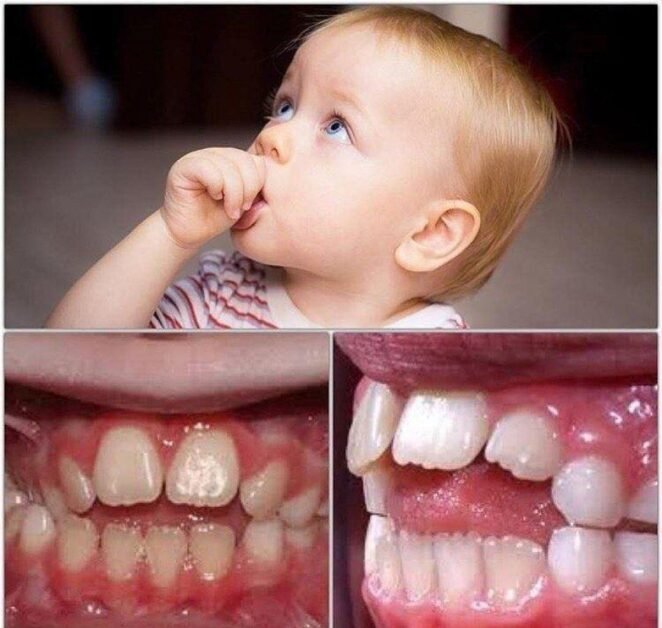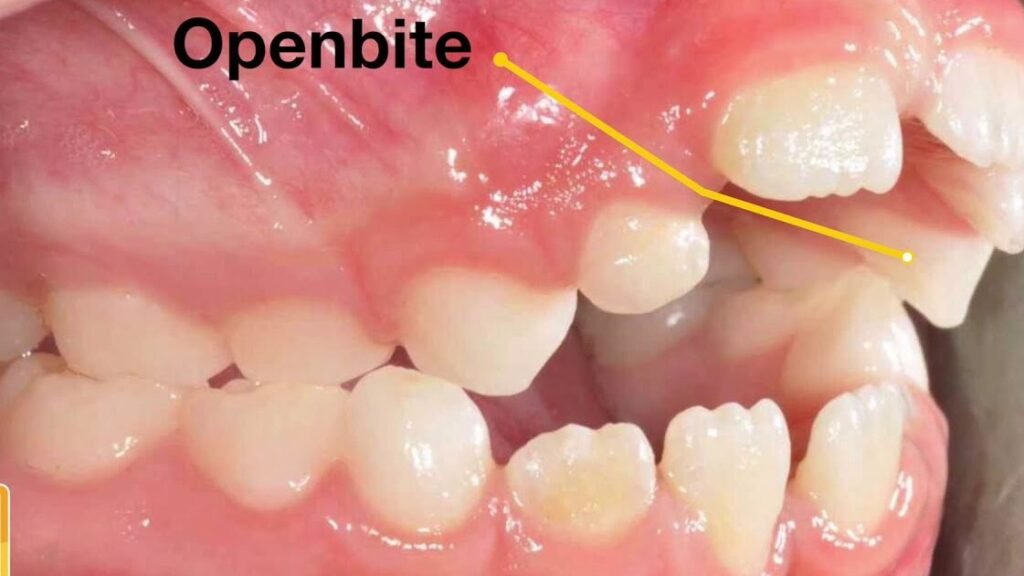Physical Address
304 North Cardinal St.
Dorchester Center, MA 02124
Physical Address
304 North Cardinal St.
Dorchester Center, MA 02124

High Cost of Thumb Sucking: The Impact on Oral Health and Development. Learn about the impact of thumb sucking on oral health and development and how to address it.
Misalignment of teeth can have a lasting impact on oral health, Thumb Sucking affects individuals well into adulthood. When teeth are not properly aligned, it can lead to difficulties with biting, chewing, and even speaking. Over time, this misalignment can also contribute to excessive wear on certain teeth, uneven distribution of forces during chewing, and increased risk of tooth decay and gum disease.

Furthermore, untreated teeth misalignment can progress into more serious issues such as malocclusion, where the upper and lower teeth do not fit together correctly. This condition may result in discomfort, pain, and an increased risk of developing temporomandibular joint disorders. It is vital to address teeth alignment concerns early on to prevent these potential long-term consequences and maintain optimal oral health throughout life.
Open bite is a dental condition where the upper and lower front teeth do not touch when the mouth is closed. This misalignment can lead to various issues, including difficulty in chewing food properly, speech difficulties, and potential strain on the jaw joints. One of the contributing factors to the development of an open bite is the prolonged use of pacifiers or thumb-sucking in children.
Children who continue to engage in these habits past the age when their permanent teeth start to come in are at an increased risk of developing an open bite. The pressure exerted by sucking on a pacifier or thumb can alter the alignment of the teeth and affect the growth of the jawbone, leading to an open bite formation. Early intervention and breaking these habits can help prevent the progression of this condition and promote proper teeth alignment and jaw development.
Improper tongue placement and alignment issues resulting from early childhood habits or oral conditions can significantly impact speech development in children. These issues can lead to difficulties in articulating certain sounds correctly, affecting the overall clarity and quality of speech. The improper positioning of the tongue due to poor teeth alignment can result in speech impediments that may require speech therapy for correction. Additionally, changes in the oral cavity structure caused by misaligned teeth can also contribute to speech irregularities, hindering effective communication skills in children.

Furthermore, the alignment of teeth plays a crucial role in the formation of certain sounds during speech production. Misaligned teeth can impede the precise contact required between the tongue and teeth to produce specific sounds, leading to speech distortions. As a result, children with untreated dental issues affecting teeth alignment may struggle with pronouncing certain words or sounds correctly, impacting their ability to communicate effectively. Early intervention by a dental professional is essential to address these issues promptly and prevent long-term detrimental effects on speech development.
Dry and cracked skin on the roof of the mouth, known as the palate, can be a concern that may arise due to various factors. This delicate area can be vulnerable to damage from excessive heat or sharp foods, leading to discomfort and potential complications. The palate plays a crucial role in the overall oral health ecosystem, affecting processes such as chewing, swallowing, and even speech. Therefore, any damage to this area should not be taken lightly, as it may impact the individual’s daily functions and overall well-being.
In more severe cases, particularly in pediatric patients, persistent damage to the roof of the mouth can result in chronic inflammation or sores, hindering the individual’s ability to eat and speak comfortably. Furthermore, repeated trauma to this area can impede proper oral development and potentially lead to long-term issues such as altered dental alignment or jaw growth. Thus, it is essential to address any signs of damage to the palate promptly to prevent further complications and ensure optimal oral health for the future.

Improper jaw development in children can have significant long-term consequences on their overall oral health. The jaw plays a crucial role in supporting the alignment of teeth and facilitating proper chewing function. When jaw development is disrupted, it can lead to misalignment of the teeth and malocclusion, which may require extensive orthodontic treatment to correct. Additionally, a poorly developed jaw can impact the overall facial structure and aesthetics, affecting the individual’s confidence and self-esteem.
Early detection and intervention are crucial in addressing issues related to jaw development in children. A thorough examination by a pediatric dentist can help identify any abnormalities or deviations in jaw growth patterns. Implementing appropriate treatment strategies, such as orthodontic appliances or dental interventions, can help guide proper jaw development and prevent long-term complications. By addressing jaw development issues proactively, parents and caregivers can ensure their child’s oral health and overall well-being are optimized for the future.
Improper tongue positioning can have a significant impact on overall oral health and even beyond. The proper placement of the tongue against the palate is crucial for various essential functions such as chewing, swallowing, and speaking. When the tongue rests in a lower position, it can lead to a range of issues including speech impediments, swallowing difficulties, and even potential jaw misalignment.
Furthermore, incorrect tongue posture can also affect the development of the dental arches and teeth alignment. The pressure exerted by the tongue against the teeth and the palate plays a crucial role in guiding the growth and positioning of the teeth. Disruption in this equilibrium can contribute to malocclusions, overcrowding, and even hinder the success of orthodontic treatments. It is imperative to address and correct any deviations in tongue posture early on to prevent long-term consequences on dental and overall health.
Delayed permanent teeth eruption can have significant implications for a child’s dental health and overall development. When permanent teeth are slow to emerge, it can lead to crowding issues and misalignment in the growing dentition. The delay in eruption can disrupt the natural sequence of teeth moving into their proper positions, potentially causing complications that may require extensive orthodontic treatment to correct.
Furthermore, delayed permanent teeth eruption may impact the aesthetics of the smile and affect a child’s self-esteem. As other children their age begin to lose their baby teeth and grow in their permanent ones, a child experiencing delayed eruption may feel self-conscious about their appearance. Addressing delayed permanent teeth eruption promptly and effectively is essential to prevent long-term oral health issues and ensure a healthy and confident smile for the future.
Table
| Effect | Description | Resolution |
|---|---|---|
| Primary Teeth Damage | Active thumb sucking can cause damage to primary teeth, which usually corrects itself as permanent teeth come in. | Often self-correcting |
| Permanent Teeth Misalignment | Persistent, vigorous thumb sucking may cause misalignment of permanent teeth and affect the jaw or the shape and roof of the mouth. | May require dental intervention |
| Bite Issues | Overbite, open bite, and inward tipping of bottom teeth can occur. | Depends on severity and duration |
| Jaw Shape Changes | Changes to the shape of the jaw can affect the alignment of teeth and speech patterns. | Possible need for orthodontic treatment |
| Sensitivity | The roof of the mouth may become sensitive. | Varies individually |
| Delayed Eruption | Thumb sucking habit can delay the eruption of permanent teeth, though the delay is often not significant. | Monitoring and potential dental care |
Excessive pacifier use in infants and young children can potentially lead to an increase in overbite. Overbite refers to the upper front teeth overlapping excessively over the lower front teeth when the jaws are closed. Prolonged and frequent sucking on pacifiers can put pressure on the front teeth, causing them to shift forward and upward, ultimately resulting in an increased overbite. This misalignment of the teeth can affect the overall oral health and functionality of the mouth.
Moreover, an increased overbite can impact a child’s ability to chew properly, leading to difficulty in biting into and breaking down food. It can also affect the clarity of speech and pronunciation. Addressing pacifier overuse early on and encouraging proper oral habits can help prevent the potential increase in overbite and promote healthy dental development in children.
Facial structure is intricately linked to the alignment and health of the teeth. Misaligned teeth can impact the development of the jaws, leading to potential asymmetry in the facial structure. The positioning of the teeth plays a crucial role in supporting the lips, cheeks, and overall facial aesthetics. Misaligned teeth can result in a misaligned bite, which may contribute to facial disproportions and affect one’s overall facial harmony.
Furthermore, the relationship between the upper and lower jaws can significantly influence the facial appearance. If there is malocclusion or improper alignment of the jaws, it can lead to a weak chin, protruding jaw, or sunken cheeks, altering the overall facial profile. Additionally, misaligned teeth can impact the development of the facial muscles, potentially leading to asymmetries or imbalances in the facial structure. Addressing teeth alignment issues early on can help maintain proper facial symmetry and enhance the overall aesthetic appeal of an individual’s face.
Poor dental alignment can contribute to an increased risk of Temporomandibular Joint Disorder (TMJ) in individuals. TMJ disorder affects the temporomandibular joint, causing pain and dysfunction in the jaw joint and the muscles that control jaw movement. Misaligned teeth can lead to uneven pressure distribution on the jaw when biting and chewing, potentially straining the joint and surrounding muscles over time.
Table
| Risk | Impact | Prevention |
|---|---|---|
| Thumb Sucking | Can lead to TMJ issues due to teeth misalignment and jaw pressure. | Early cessation and dental consultation. |
| Malocclusion | Stresses TMJ, causing pain and dysfunction. | Orthodontic correction. |
| Muscle Strain | Tightens jaw muscles, increasing TMJ strain. | Relaxation techniques and therapy. |
| Altered Growth | Affects jaw development and occlusion, impacting TMJ. | Orthodontic treatment for proper growth. |
Moreover, when the teeth do not align properly, it can affect the overall balance of the jaw and lead to issues with the temporomandibular joint. This misalignment can result in jaw pain, clicking or popping sounds when opening or closing the mouth, and even restricted movement of the jaw. These symptoms not only impact the individual’s oral health but can also affect their daily quality of life by causing discomfort and difficulty in performing everyday activities such as eating and speaking.
The primary teeth, also known as baby teeth, play a crucial role in a child’s dental development. These teeth act as placeholders for the permanent teeth and help in proper speech development, chewing, and facial structure support. However, potential damage to primary teeth can have far-reaching consequences if left untreated.
Primary teeth are susceptible to decay and cavities, which, if not addressed promptly, can lead to pain, infection, and premature loss of these teeth. The premature loss of primary teeth can disrupt the normal eruption pattern of permanent teeth, potentially causing alignment issues and the need for orthodontic treatments in the future. It is paramount to prioritize early dental care and preventive measures to safeguard the health and integrity of primary teeth, ensuring a solid foundation for a child’s overall oral health.
Bruxism, the habitual grinding or clenching of teeth, can have detrimental effects on oral health. When left unchecked, bruxism can lead to wearing down of the teeth, jaw pain, and even potential jaw disorders. The act of grinding can put excessive pressure on the teeth, causing them to weaken over time. This can result in tooth sensitivity, discomfort, and even dental fractures.
Teeth grinding also has the potential to disrupt the alignment of the teeth, leading to issues such as misaligned bites and crooked teeth. These misalignments can further exacerbate the problem, as they may create uneven pressure on the teeth during grinding, causing even more damage. It is essential to address bruxism early on to prevent these long-term consequences and preserve the overall health of the teeth and jaws.
Oral infections pose a significant risk to one’s overall dental health. These infections can arise from various factors, including poor oral hygiene practices, untreated cavities, or compromised immune systems. Bacteria in the mouth can proliferate, leading to conditions such as gum disease, tooth decay, or abscesses. Once an infection takes hold, it can spread rapidly, causing pain, swelling, and discomfort for the individual. Moreover, untreated oral infections can potentially lead to systemic health issues if left unchecked, underscoring the importance of prompt dental intervention and care.
Prevention is key to reducing the risk of developing oral infections. Maintaining a consistent oral hygiene routine, including brushing and flossing regularly, visiting the dentist for routine check-ups and cleanings, and addressing any dental issues promptly are crucial steps in safeguarding against oral infections. Additionally, a balanced diet low in sugary and acidic foods can also contribute to overall oral health and reduce the likelihood of developing infections. By prioritizing preventive measures and seeking timely treatment when needed, individuals can minimize the possibility of oral infections and promote optimal dental well-being.
Individuals experiencing dental issues that impact their smile alignment may often face challenges with self-esteem and social interactions. The aesthetics of one’s teeth play a significant role in forming first impressions, and any misalignments or visible dental problems could lead to feelings of self-consciousness and reduced confidence in social settings. Research suggests that individuals with malocclusions or untreated orthodontic issues may experience higher levels of dissatisfaction with their appearance, which can negatively affect their self-esteem and overall quality of life.
Furthermore, the impact of dental issues on self-esteem can extend to social relationships and interactions. Individuals who feel insecure about their smile may be less likely to engage in social activities, speak confidently in public, or smile openly, leading to potential difficulties in forming connections with others. Poor oral health and visible dental concerns may contribute to feelings of embarrassment or fear of judgment, causing individuals to withdraw from social situations and miss out on valuable opportunities for personal and professional growth.
The financial costs associated with corrective dental treatments can vary greatly depending on the specific needs of each individual patient. In general, orthodontic procedures such as braces or clear aligners can range from a few thousand to several thousand dollars. Additional treatments like jaw surgery or specialized appliances may incur even higher expenses. It is important for patients to consider the long-term benefits of these treatments, not just in terms of oral health, but also in terms of overall well-being and confidence.
Patients should also be aware of potential hidden costs such as follow-up appointments, adjustments, and maintenance after the initial treatment. These ongoing expenses, coupled with the initial cost of corrective treatments, emphasize the importance of thorough discussions with dental professionals to understand the complete financial implications. Taking proactive steps towards maintaining good oral health through regular check-ups and preventive measures can help minimize the need for extensive corrective treatments in the future, ultimately reducing the overall financial burden.
Without corrective treatments, there is a risk of misaligned teeth becoming progressively worse over time, leading to difficulties with chewing, speaking, and overall oral health.
Untreated dental issues can affect the positioning of the tongue and teeth, which may result in speech impediments and difficulties with proper pronunciation.
The financial costs of corrective treatments can vary depending on the severity of the condition and the specific treatment plan recommended by a dentist or orthodontist. It is important to consider the long-term benefits of investing in dental health.
Untreated dental issues can lead to aesthetic concerns, such as crooked teeth or an uneven smile, which may impact an individual’s self-esteem and confidence in social situations.
Yes, untreated dental issues can increase the risk of developing conditions such as temporomandibular joint disorder, oral infections, and bruxism, which can have negative impacts on overall health and well-being.